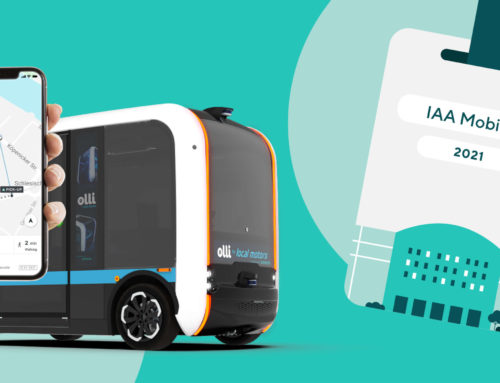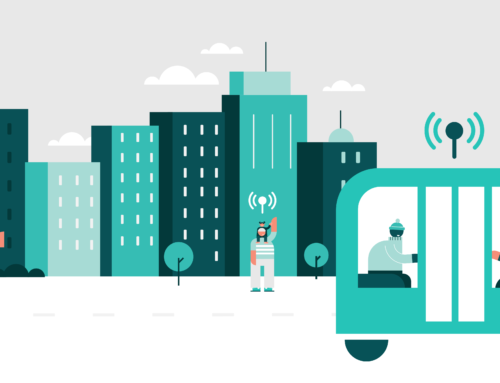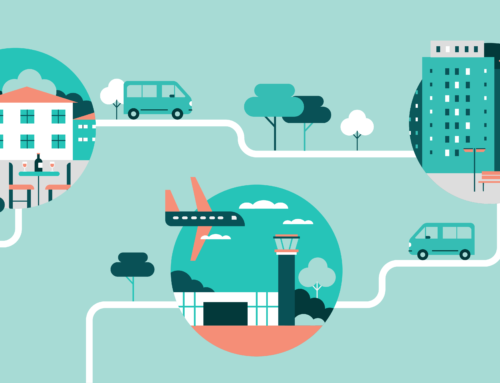Unique nature instead of the urban jungle, customs instead of modernity: Bavaria is known beyond its borders for its loyalty to tradition. So it’s all the more surprising that mobility in Bavaria is currently taking great strides forward. We’ve taken a closer look at three new offers.
door2door has already been able to put six new on-demand buses on the road in cooperation with municipalities and transport operators in Bavaria. In total, there are already eight ridepooling services throughout the state. In addition to flexible extensions of mobility in Bavaria, such as the MVG Isar and ParkstadtTiger and swaxi in Augsburg, new on-demand bus services are an important enrichment, especially in the countryside, which have been increasingly threatened by rural exodus in recent years. They close gaps in local public transport services, offer an alternative to private cars that is both efficient and flexible, and make rural life more attractive again. So let’s take a closer look at a few success stories in the Bavarian countryside.
Murnau’s on-demand bus combats increasing car traffic
The idyllically situated town of Murnau attracts many day tourists from Munich and the surrounding area, especially in spring and summer. Since the regional train station in Murnau is poorly connected to the wider region, many visitors used their own cars for a trip to the countryside. door2door brought “Ortsbus Murnau” to the streets of Murnau as an on-demand bus solution in the summer of 2020.
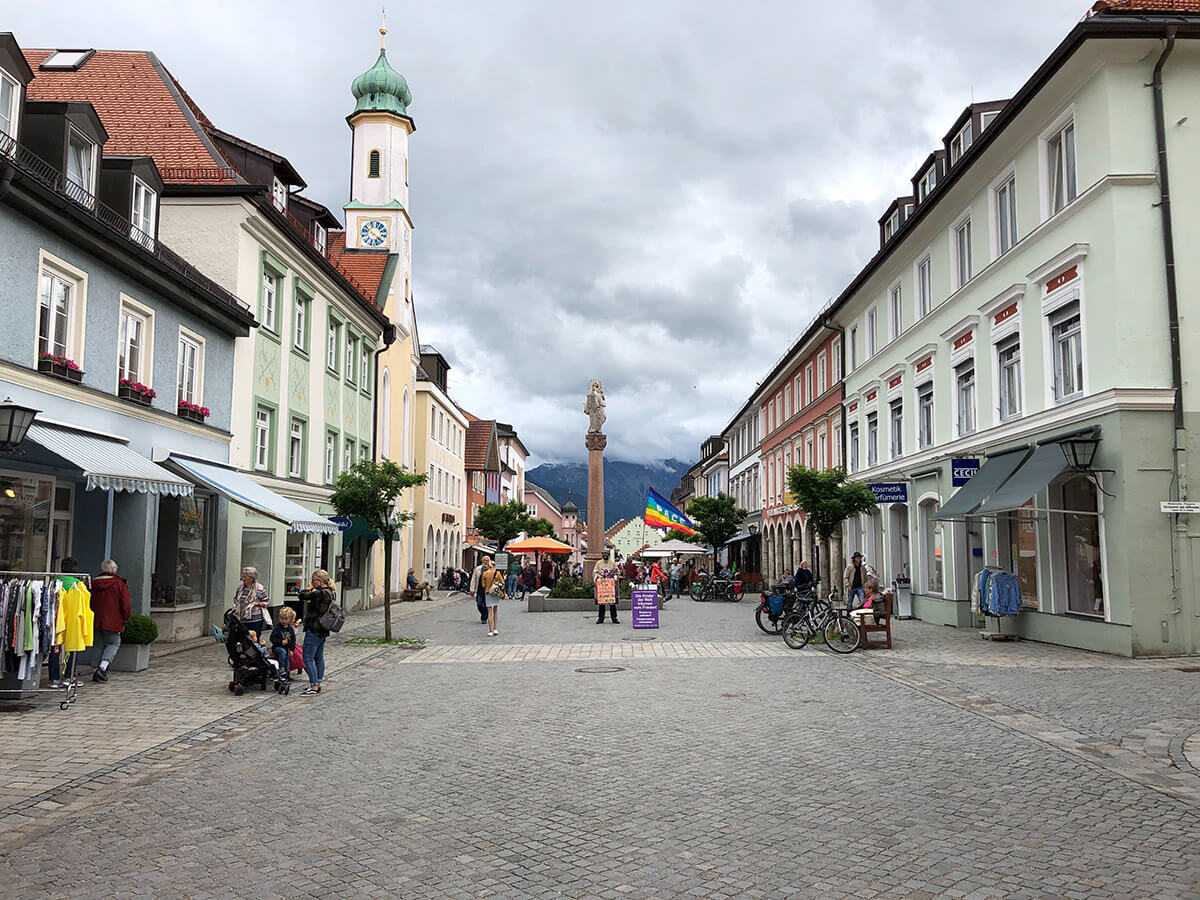
Idyllic Murnau
With the introduction of an innovative call bus, Clemens Deyerling and his team from the mobility start-up omobi set their sights on improving public transport quality in the countryside and declared war on increasing car traffic. Using technology from door2door, omobi has been providing more mobility in Bavaria since the summer of 2020 with the “Ortsbus Murnau”.
Clemens Deyerling, omobi aims to close gaps in public transport. What exactly does omobi do?
Clemens: omobi is a young transport company that no longer wants to accept that mobility in rural areas came to a standstill in the 1980s. In concrete terms, this means that we develop digital mobility concepts for rural regions and municipalities and also operate an on-demand bus in our home town of Murnau.
We are only at the beginning here and the country can benefit from digitalization to an extent that is even more considerable than in the city.
— Clemens Deyerling, omobi
Why is digitizing public transport in the countryside so important for maintaining public services?
Digitalization and the possibilities it offers are what put us in a position to rethink mobility in rural areas in the first place. We are only at the beginning here and the country can benefit from digitalization to an extent that is even more considerable than in the city. This is the only way for the state to be able to fulfil its duty to provide encompassing public services.
Why is the digitalization of public transport in rural areas so important for maintaining public services? What challenges does traditional scheduled transport bring in rural areas?
It is impossible to imagine rural areas without traditional scheduled transport and it will continue to be an important part of the overall mobility chain. Especially for school transport or heavily frequented commuter routes, scheduled transport is optimal because it is efficient. However, it has its weaknesses in ensuring a truly comprehensive provision of public transport services. It is also quite inflexible, so for most people it is not a true alternative to using their own car.
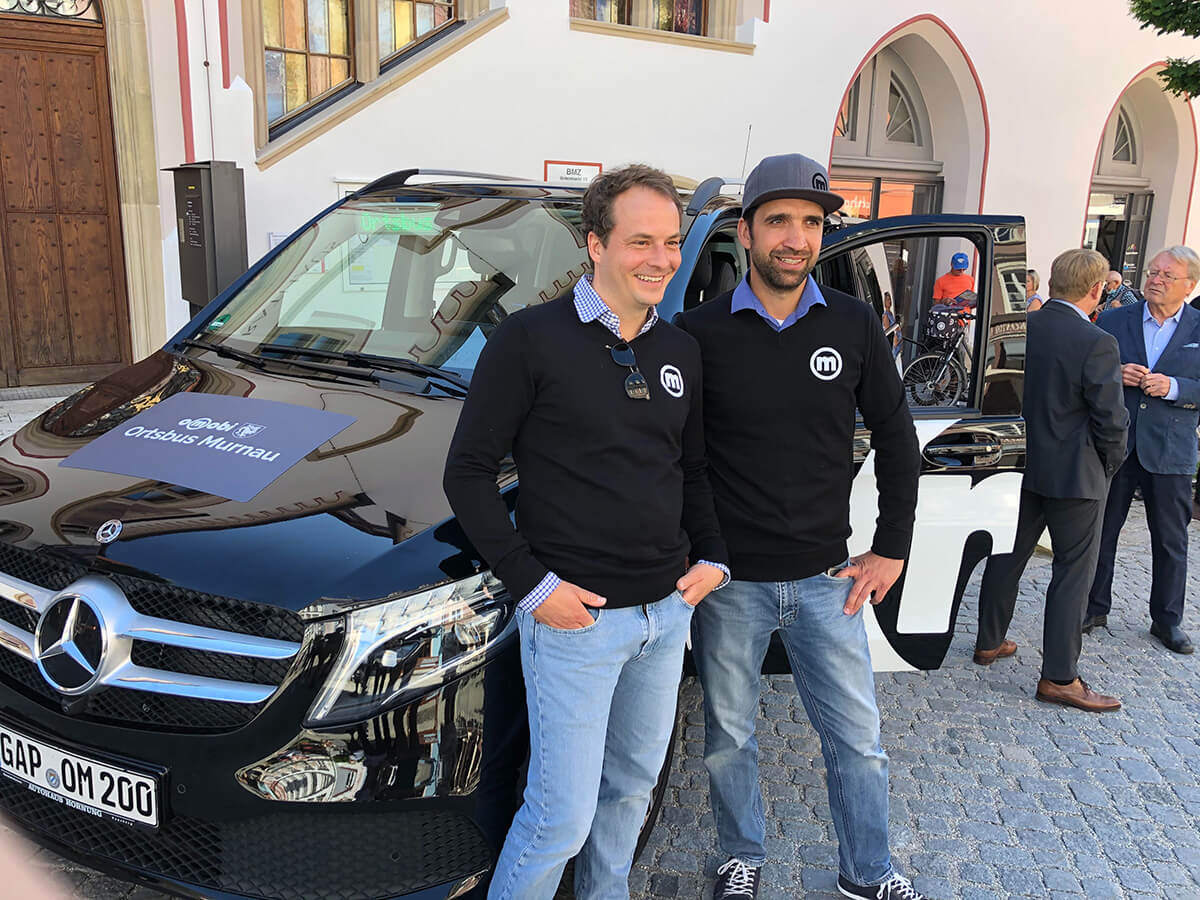
Clemens Deyerling at the launch of the omobi Ortsbus Murnau in cooperation with doo2door.
What goals are you pursuing with the launch of Murnau’s on-demand bus in terms of both mobility and the lives of local residents? What are the next steps?
We want to make it possible for everyone to get from one place to another easily and sustainably, even in the countryside. This vision drives us and is our declared goal behind the “Ortsbus Murnau”. Since July 2020, life has changed completely for many people in Murnau. You see elderly people suddenly coming into the village for coffee. Parents sending their children to football training in the on-demand bus. Tourists moving from sight to sight without a car, and out-of-the-way beer gardens that are now easy to reach. The next steps are an expansion of the operating area around Murnau, as well as new projects in the surrounding area.
In our webinar, Clemens Deyerling told us more about the new on-demand service in Murnau. Learn more in the Lab4 Mobility webinar recording (German language only).
Hofer LandBus: Ridepooling for more mobility in Bavaria
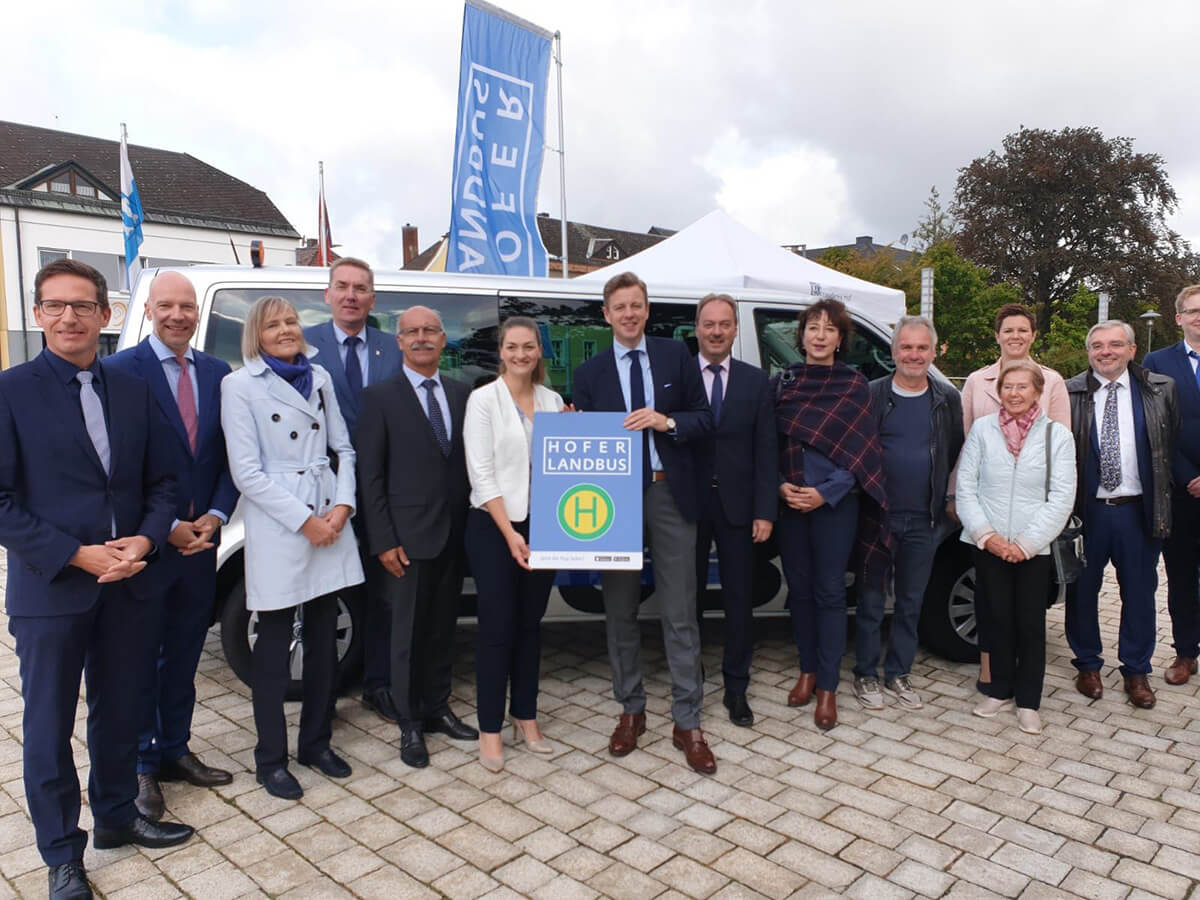
The Hofer LandBus has been in operation on the roads of Hof since September 2019.
Since September 2019, the Hofer LandBus has been operating across 120 square kilometres of the municipalities of Rehau and Regnitzlosau in the Franconian district of Hof. The offer for more mobility in Bavaria is one of the most ambitious on-demand projects in a rural area with high availability and stop density: 170 virtual stops are spread over the entire area. In addition, cooperation with local taxi companies plays an important role. Andreas Weinrich, Managing Director of Logistik Agentur Oberfranken e.V., and Korbinian Göths, transport planner for the project “Mobilität digital Hochfranken”, are in charge of the Hofer LandBus project.
The Hofer LandBus is intended to create more mobility in Bavaria and thus also more incentives for living in the countryside. How do you make traditional rural public transport even more user-friendly and accessible?
Weinrich: Rural mobility in Bavaria is very much characterized by the compulsory task of transporting schoolchildren. Outside school hours and during holidays, the offer is often limited. Demand-driven services such as the Hofer LandBus make it possible to significantly expand service times and thus create a comprehensive service.
Göths: It is important to think of services from the user’s point of view. This means being open to new ideas, responding to the wishes of the population and combining “old paths” with new ideas. Public transport in rural areas therefore faces a number of challenges.
Hof’s aim is to also connect smaller districts through public transport in order to provide mobility for as many people as possible. In concrete terms, this also means that public transport cannot just encompass school transport to be competitive with private cars. The Hofer LandBus focuses even more on the users and is marked by a high degree of flexibility.
In addition, many public transport services are not perceived by users because there is a lack of awareness. The district of Hof has therefore marked the virtual stops of the Hof LandBus with ridepooling bus stop signs.
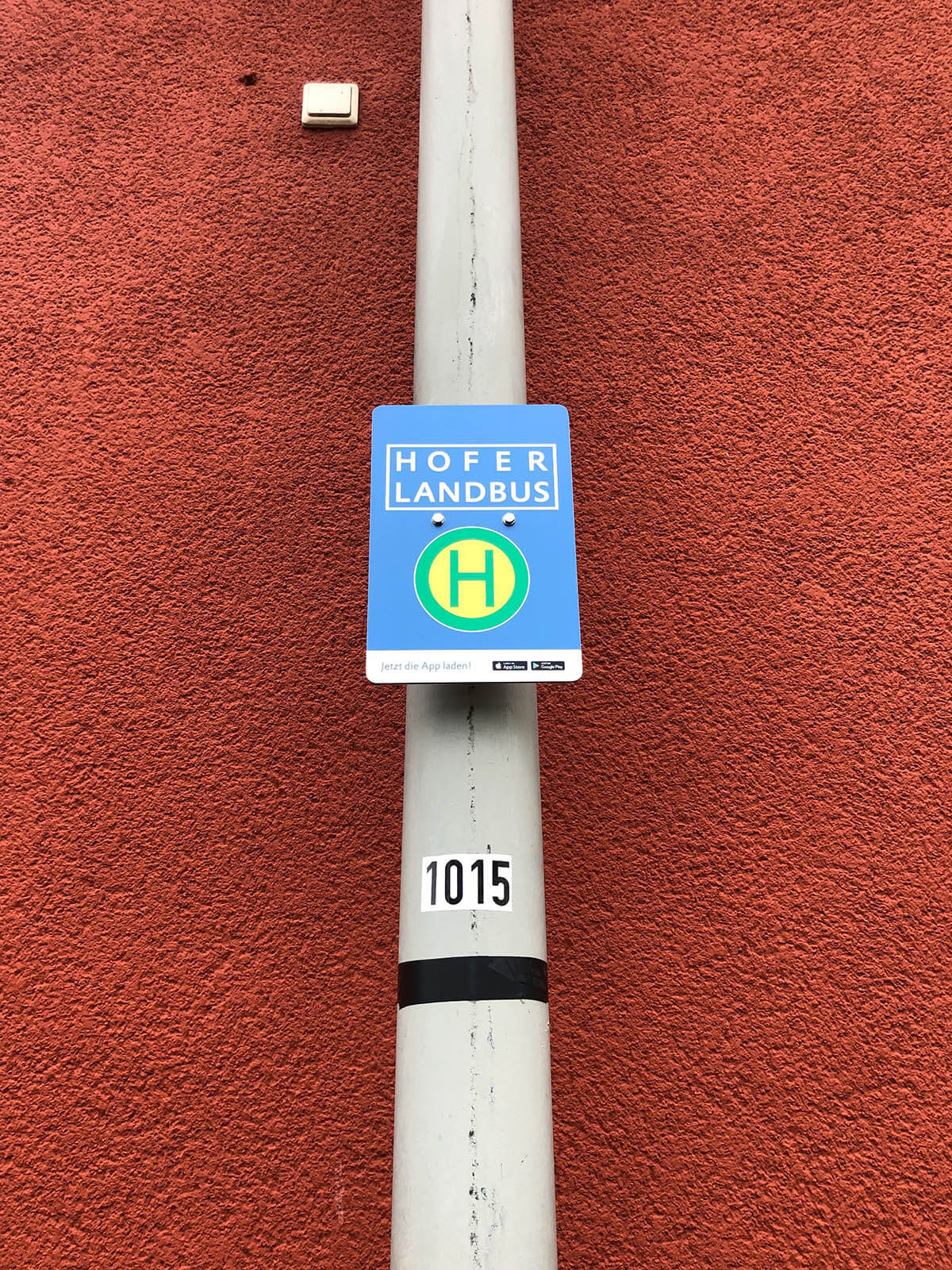
Moreover, people who have been travelling to work by car for 10 years will not simply get up one morning and decide to take a bus or a bicycle. For this to happen, a process of reflection must be initiated in which people become aware of the advantages of the eco-modes of transport. In all measures, it is important that users find a functioning and reliable offer and can easily inform themselves.
What were the biggest challenges in implementing the Hofer LandBus?
Weinrich: Persuading potential passengers and advertising the product. The demographic age structure in rural areas made the project more difficult because booking by telephone is considered mandatory. In addition, a challenge was to find a suitable partner for the operation.
With solutions like the Hofer LandBus, even residents of very small villages can benefit from mobility like in big cities, without empty buses driving along rigid bus lines every 10 minutes.— Korbinian Göths, transport planner for “Mobility digital Hochfranken”
Göths: The government of Upper Franconia was very open to the project, but first had to ask whether and how approval was even possible, since the Public Transport Act does not provide for such services so far. This is expected to change with the next amendment.
The search for a transport company was not easy. Such a project is also a challenge for the companies involved and requires a lot of local expertise. Until shortly before the end of the tender, we could not be sure whether we would find a partner who would support us with the Hofer LandBus.
In addition, marketing was difficult. How can you get people excited about public transport when most of them own a car? In the end, it was mainly through personal contact that we were able to make the population aware of the offer. The service was presented at events and the Hofer LandBus visited various festivals and markets with an information stand. One of the most important questions from the population concerned booking. There was a great desire to be able to book by telephone. Some people own a smartphone but did not know how to install apps on it. We took the time to talk to people and explain the advantages of app booking. In retrospect, this effort has paid off. The Hofer LandBus app now has 3,000 registered users. In purely statistical terms, that is every fourth inhabitant of Regnitzlosau and Rehau. Although passenger numbers dropped during the peak phase of the coronavirus, the Hofer LandBus continued to be used and is now recovering quickly.
How can innovative mobility offers influence the quality of life and contribute to reducing rural exodus?
Weinrich: Rural areas are attractive when they offer jobs at all levels of qualification. This is the basic prerequisite. But an area must also have a good public transport system for people who are staying as well as for those who are moving in. Due to population density, this can only be achieved at reasonable cost with innovative services. In turn, new jobs will only be created if companies setting up in the area know that their businesses are not only accessible by private car. In this respect, these issues are mutually dependent.
Göths: New residents or residents returning home are among those who now populate the district of Hof. They have benefited from mobility offers in big cities for years, but they also enjoy nature and recreation in the countryside. They are used to public transport and are open to “alternative” forms of mobility. With solutions like the Hofer LandBus, even residents of very small districts can benefit from the types of mobility now becoming common in big cities, without empty buses running along rigid lines every 10 minutes.
New residents can use public transport, just like they are used to. This benefits not only locals, but also guests. Innovative public transport like in big cities means short distances to bus stops, affordable mobility and short waiting times. Normally, the Hofer LandBus picks up the passenger within 10 minutes. Short distances to the next stop also enable people with physical disabilities to use public transport. To support this, the Hofer LandBus also has a vehicle suitable for wheelchairs.
Pre-booking makes it possible to offer a chain of travel; passengers can travel by train to the station and then from there to their final destination with the Hofer LandBus without having to wait for a long time or being afraid of missing the connection. Flexible services like the Hofer LandBus are environmentally friendly because they only run when needed and pool similar journeys to keep resource requirements minimal.
The environment also benefits from the Hofer LandBus, as unlike conventional public transport, it only runs when there is demand. In contrast to the car, ridepooling reduces the number of journeys. Innovative mobility offers are helping rural areas to compensate for a decisive disadvantage when compared to big cities. It is easy for families to do without a second car, while enjoying all the advantages of the glorious countryside.
Based on previous experience with the Hofer LandBus in the Rehau & Regnitzlosau areas, consideration is currently being given to how the Hofer LandBus can also be expanded to other district communities. The coordination with existing transport services and the dovetailing of various offers will play an increasingly important role in this context.
Learn more about mobility in Bavaria: Read about our success stories in Munich and Freyung.

